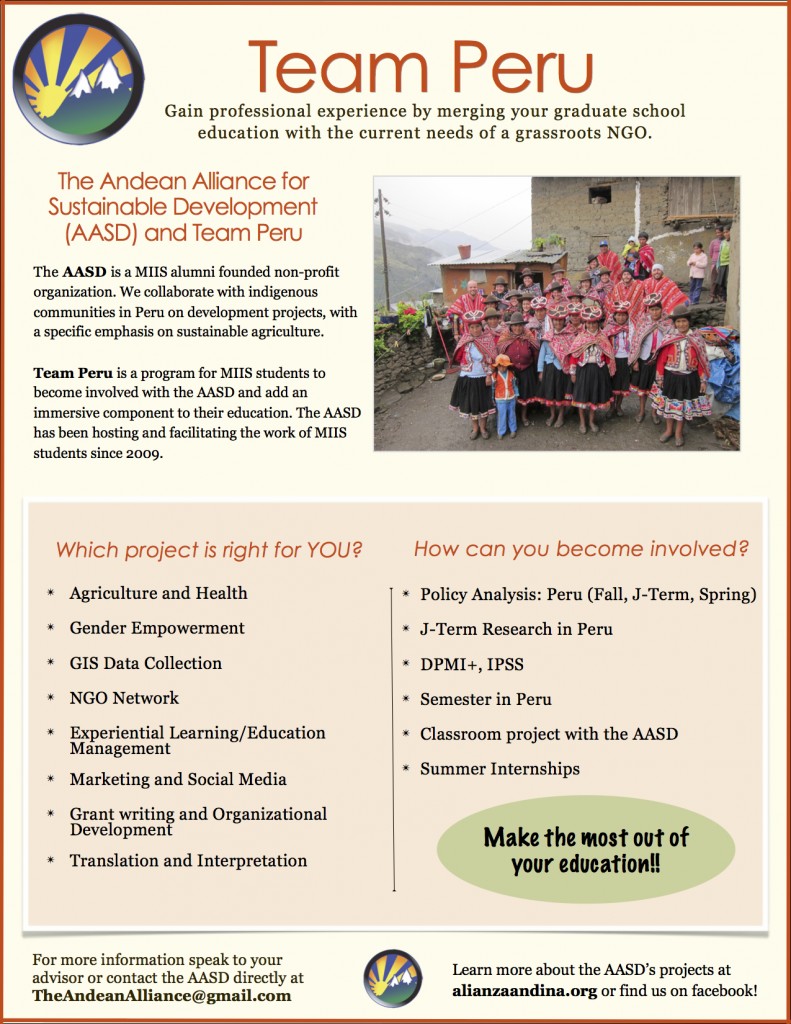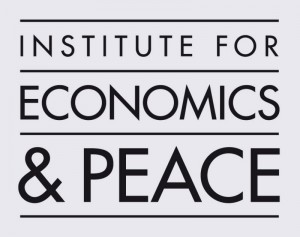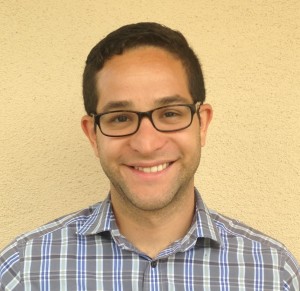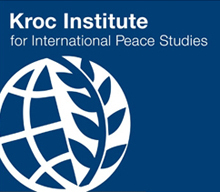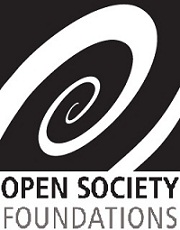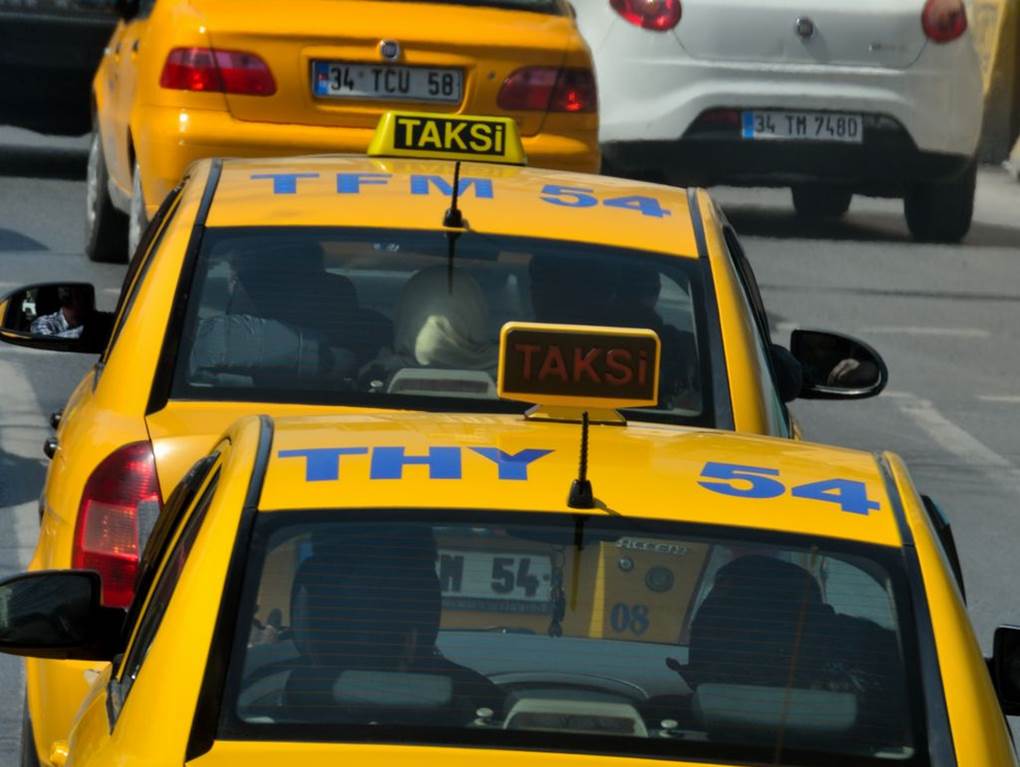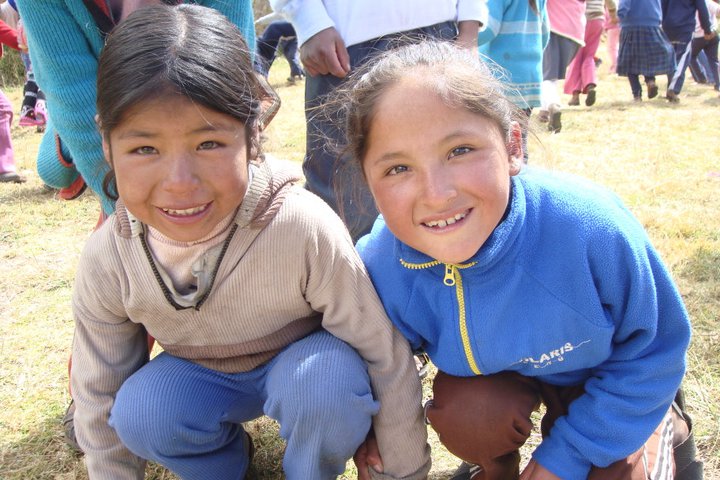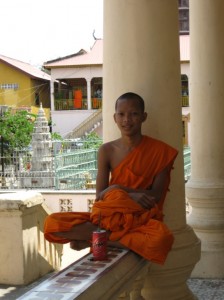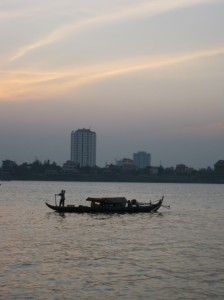Archive for Immersive Learning (MIIS & External Ops)
Monday, August 25th, 2014
Research Fellowship with Institute for Economics & Peace
The Institute for Economics and Peace is searching for a full-time Research Fellow to join their research team at their headquarters in Sydney, Australia. Click here to download full position description.
A Research Fellow will conduct research on topics related to the Global Peace Index, peace economics, development studies and peace and conflict studies.
Application Deadline: August 28th, 2014
Selection Criteria:
1. Master’s degree (PhD an advantage) in a combination of economics and/or statistics, international
relations or other social sciences discipline.
2. Minimum of three to five years professional experience conducting empirical research and
quantitative data analysis specifically related to a combination of social sciences, development
studies, economics, statistics and peace and conflict studies.
3. Experience working with governmental and non-governmental organisations (NGOs) on peace
economics, peace and conflict studies, and international development issues.
4. Experience handling large datasets and knowledge of R, SPSS, STATA, and other related econometric
packages is required. Ability to write code for R, SPSS or STATA and advanced Microsoft Excel skills.
5. Track record of demonstrable analytical and data visualisation skills.
6. Excellent verbal and written communication skills. Competence to undertake research assignments
and project manage teams with minimal supervision.
Applications to: CV and cover letter addressing the selection criteria and desired personal qualities to Lucie
Paleckova on info@economicsandpeace.org
Deadline for applications: 28 August, 2014
Website: www.economicsandpeace.org, www.visionofhumanity.org
Friday, August 22nd, 2014
Reflection Post IPSS Placement Presentations
On Tuesday August 19, the 2014 cohort of the International Professional Service Semester (IPSS) program conducted their placement presentations of their semester-long experience in front of a select group of faculty and staff. As Graduate Assistant for GSIPM Immersive Learning and Special Programs, I took an active role behind the scenes, taking on the logistics to ensure that each of the Fellows were able to connect to the designated conference rooms where an anxious audience was expected to learn about their experience.
The task was challenging, as I had to make sure that all the technical details were taken care of for the 23 fellows to be able to connect smoothly from several countries and across several time zones. However, the job gave the unique opportunity to participate in the sessions and learn about the amazing work that each of the fellows has been doing at each of their placements for the past 3-6 months.
As a MIIS student accepted to IPSS for Spring 2015 and currently looking for placement opportunities, listening to the students’ presentations solidified the notion that doing IPSS in Spring 2015 is the right choice for my future, and here is why:
Firstly, I was impressed by the way that each of the fellows presented him or herself. They were all confident and used technical language that made them sound like real subject matter experts. For a bit it was hard to believe that just a few months ago they were just students in the classroom like me, because I would expect that such level of professionalism and technical expertise would only come from seasoned professionals. I know for fact, that those are skills that can’t be necessarily learned in a classroom, which to me was a statement of the value of IPSS as an immersive learning option.
Secondly, none of the fellows mentioned having regretted doing IPSS and all of them were visibly happy with the end results of their placements. Even though, there were some difficulties – which are all part of the professional growth process – all of the fellows managed to overcome them and make the most out of their experience. When asked by faculty about what they would have done differently, the overwhelming majority answered that early preparation is key and in terms of defining their role and specific tasks. I, of course, adopted that reflection as a recommendation that will be implementing in the upcoming months.
Finally, when asked about future plans, the majority of fellows responded that thanks to the IPSS experience they were able to ensure employment either at their host organizations or at another location that they were introduced to thanks to their IPSS placements. This statement adds value to the notion that immersive learning ensures a solid bridging between the academic and professional worlds, which is very unique to the MIIS experience.
My congratulations go to each of the 2014 IPSS fellows for their success and I thank you all for being such great role models.
Julio Noguera is a Graduate Assistant for GSIPM Immersive Learning and Special Programs. At MIIS he is pursuing his MPA with a focus on Program Evaluation and Management. Before coming to MIIS, Julio spent 5 years in Washington, DC where he served as Junior Project Manager backstopping several multi-million dollar development projects in Africa, Latin America, the Caribbean and Asia. He received his BA in Economics, International Business and French from Westminster College in Missouri and participated in DPMI during the summer of 2007 as Davis UWC Fellow.
Friday, August 8th, 2014
Job Openings in Policy Research and Data Analysis
Research Associate in Policy Studies, Kroc Institute, University of Notre Dame
The Kroc Institute for International Peace Studies at the University of Notre Dame seeks applications for the position of Research Associate in Policy Studies. The Research Associate will work closely with the Director of Policy Studies at the Kroc Institute on research projects, curriculum development, and organizing research and education events both at Notre Dame and elsewhere.
Application deadline: August 8th
Open Data Analyst, Open Society Foundations, London or New York
The CODEX program seeks to leverage a wide range of open (and sometimes not-so-open) information relating to the extraction of oil, gas, and mineral resources in developing countries. The purpose of the work is to demonstrate, using innovative techniques and creative approaches to data-storytelling, how open data can be a powerful tool in the fight against mismanagement and plunder of natural resource wealth in the world’s poorest countries. This work would constitute a contribution to the growing field of “Open Government.”
Application deadline: August 17th
Monday, August 4th, 2014
Courage Under Fire: An Intimate Look at UN Peacekeeping
UNA-USA – Nationwide conference call on Wednesday, August 6 at 2 p.m. ET
with
Ken Payumo
Chief of the Peacekeeping Operations Support Section for the Department of Safety and Security, United Nations
Wednesday, August 6, 2 p.m. ET
U.S./Canada Dial-in: 866-454-4208
Passcode: 8136862
Please RSVP via email to membership@unausa.org.
What do you do when you are up against a government trying to harm its own people? As men with guns tried to enter the UN camp in Bor, South Sudan, Ken Payumo, a civilian officer in charge, stood up to the South Sudanese military when 12,000 refugees fled to the UN base for safety. His brave actions are thought to have saved thousands of lives.
Join us for a conversation with Mr. Payumo, who will provide a closer look at the day-to-day challenges of UN peacekeeping and give an update on the current crisis in South Sudan.
About our speaker:
Ken Payumo is currently the Chief of the Peacekeeping Operations Support Section for the Department of Safety and Security. This section is responsible for overseeing the security of all UN peacekeeping missions. Having more than 14 years of experience in the United Nations, Mr. Payumo’s UN service includes that of Legal and Policy Advisor, United Nations Transitional Administration in East Timor (UNTAET); Political Officer, Department of Peacekeeping Operations (DPKO)/Asia Middle East Division (AMED); Mission Management Officer (DPKO Police Division), and most recently Head of Office for Unity and later Jonglei states, United Nations Mission in South Sudan (UNMISS).
Prior to the UN, Mr. Payumo had served as a police officer in the New York City Police Department. Mr. Payumo is a citizen of the United States of America and was born in New York City.
-Text taken directly from e-mail from UNA-USA Membership membership@unausa.org
Thursday, July 31st, 2014
MIIS Resource Centers and Initiatives: A world of possibilities just around the corner from you!
The concept of Immersive Learning is a significant component of the MIIS experience. Every student is encouraged to take advantage of the many venues available to expand his/her skills and knowledge beyond the classroom setting. Luckily, students do not need to look too far, as the Monterey Institute is home to an important number of research centers and initiatives available for students to explore innovative and original approaches to pressing global issues.
From the possibility of participating in relevant internships and fellowships, to the opportunity to conduct further research and the chance to be published in scholarly journals, faculty and staff at each of the eight research centers and initiatives are available to supplement the students’ learning process, by exposing them to specialized resources and tools.
- The Center for the Blue Economy (CBE) explores the economic contributions of the oceans and coasts to human welfare, as well as the current economic drivers that undermine ocean health.
- The Center for Conflict Studies (CCS) develops programs and publications contributing to the exploration of conflict, from understanding its causes to developing tools and skills to resolve conflicts in a non-violent manner.
- The Center for East Asian Studies (CEAS) sponsors research, seminars and lectures relating to contemporary issues pertaining to the region of East Asia (China, Japan, North Korea, South Korea, Mongolia and Taiwan).
- The Center for Social Impact Learning (CSIL), the newest research center on campus, provides programs for budding social entrepreneurs and conducts research on management issues in social ventures and impact investing.
- The James Martin Center for Nonproliferation Studies (CNS) is the largest nongovernmental organization in the world devoted to curbing the spread of weapons of mass destruction, and is the only organization dedicated exclusively to graduate education and research on nonproliferation issues.
- The Mixed-Methods Evaluation, Training and Analysis Laboratory (META Lab) aims to capitalize on the flourishing importance of data-science as a discipline, and the rising demand for evidence-based policy evaluation.
- The Monterey Cyber Security Initiative (MCySec) addresses the impact of the information age on security, peace and communication through multidisciplinary research, key-leader engagements and public-private partnerships.
- The Monterey Terrorism Research and Education Program (MonTREP) conducts in-depth scholarly research, assesses policy options, and engages in public education on issues relating to terrorism and counterterrorism, extremist groups, regional studies of terrorism, and related aspects of international and homeland security.
Wednesday, July 30th, 2014
U.S. TIP Grant Solicitation for research on Trafficking in Persons
Email from TIP Office Public Outreach [TIPOutreach@state.gov]
U.S. Department of State
Office to Monitor and Combat Trafficking in Persons
Competitive Grant Solicitation for Research on Trafficking in Persons in Supply Chains in Sub-Saharan Africa
The Office to Monitor and Combat Trafficking in Persons announces an open competition for funding of one or more projects to answer the following research question: How do supply chains that touch sub-Saharan Africa operate and intersect with trafficking in persons, and prevent trafficking in sub-Saharan Africa?
Using the results of this research question, the successful applicant will develop a highly detailed typology across sectors, commodities, regions or other subdivisions that become apparent during the research. The goal of the research is to enable governments and businesses to identify risks and best practices of programs, policies, and laws to combat those risks.
The request for proposals is posted on www.grantsolutions.gov and www.grants.gov under funding opportunity number AT-ATC-14-009. To be considered for funding, proposals must be submitted by Wednesday, August 27, 2014 at 5:00 p.m. Eastern Daylight Time.
U.S.-based and foreign non-profit organizations, for-profit organizations, non-governmental organizations (NGOs), public international organizations (PIOs), and institutions of higher education are eligible to apply.
Tuesday, July 29th, 2014
Tesla Pitch Continued: Cobalt, Graphite and Lithium
Last week the Peace Trade and Development (PTD) students met with Tesla’s global trade team at the factory in Fremont. The students were there to offer their pitch to the Tesla Challenge which called for proposals on sourcing raw materials for the new Gigafactory. In addition to the pitch session, the students were treated to lunch and a VIP tour of the Tesla factory, an impressive and re-purposed building conveniently situated in a California Free Trade Zone. “I was treating the presentation like a final exam, but when it came time to present, I had realized that we were speaking to real individuals with genuine concerns about their long-term acquisition of critical minerals. This wasn’t a quiz–my team had done in-depth research, provided a reasonable strategy, and were ready to have a conversation about alternatives.” – Shruti Korada, PTD summer 2014 student What was the best part of the Tesla challenge? Well, that’s subjective but things definitely got intriguing when one team suggested sourcing Lithium from the moon and another proposed a corporate-backed coup d’etat… Learn more about the PTD program via: go.miis.edu/ptd.
Monday, July 28th, 2014
DPMI: A learning journey
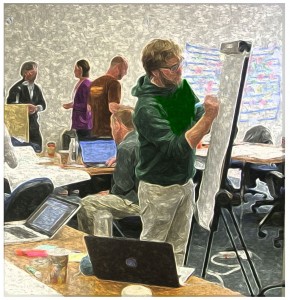
Josh Fleming (MA IPS ’15) participates in a facilitation exercise during the second week of DPMI Monterey this June.
I had heard repeatedly on campus that DPMI (Design, Partnering, Management and Innovation) is one of the most useful courses you can take. I found this hard to believe at first, but now I agree. If you haven’t taken this leadership training in international development project management and social change then you should reconsider.
You will walk away from the DPMI training having learned some ground-breaking and ‘tried and true’ tools to solving your next problem, motivating your staff or making your next big partnership. Tools that break down these processes into quantifiable, qualifiable methods to be used at a given moment or throughout the lifespan of a project.
If you are a non-profit guru, a development practitioner in training, or a social change maker then you will notice, quickly, that these tools and capacities that DPMI finds so important are actually pretty important. This is how USAID, and other major non-profit employers do it, and whether you like it or not USAID often sets the standard. Additionally, from the United Nations to grassroots organizations, from CSR departments to State department recruiters–most are looking for project management skills. DPMI fits them nicely into the longest three weeks of your life (Yes, I’ve thrown in a bit of sarcasm). It’s worth it though. I implore you to find one job posting that doesn’t ask for project management skills.
Click here to read more
Tuesday, July 15th, 2014
The IPSS Experience: Jia Ren

The International Professional Semester Service (IPSS) program has provided hundreds of MIIS graduates with the opportunity to head start their professional career, while serving in an international organization as junior professional staff member. Some fellows have even used the IPSS experience to catapult themselves to become subject matter experts, as it is the case of Jia Ren (MAIPS Trade, Investment & Development 2014).
For her placement at the Bay Area Council Economic Institute (BACEI), Jia contributed to a report entitled: Trade in the Bay Area: Investment and Global Financial Flows. The work, led by BACEI and sponsored by HSBC Bank USA, analyzed the trade, investment and commercial relations between the Bay Area and its major global trading partners, especially China, focusing on informing business leaders and other decision-makers about the potential for increased business growth in the region.
International Professional Service Semester (IPSS) is an immersive learning experience, integrating academic work with professional experience. Students serve as junior professional staff members in an international organization while producing specific deliverables for academic credit. The IPSS program is offered through the Graduate School of International Policy and Management (GSIPM) during the spring semester. For more information about IPSS please visit: go.miis.edu/ipss
Wednesday, July 9th, 2014
Announcing IPSS Placement Presentations on August 19
For 3 to 6 months, each of the 2014 IPSS (International Professional Service Semester) participants have engaged in a series of internships and short term positions. These experiences have allowed them to utilize the concepts and tools learned in previous semesters, in a real professional setting. From working towards building resilience of coastal areas in Monterey county to eradicating polio in rural India, each of the IPSS participants have had the unique opportunity to use their skills, capacities and passion to “Be the solution” of the world’s more pressing issues.
On August 19, the twenty-three 2014 IPSS participants will have the opportunity to present the work they have been carrying out previous months to the MIIS Community. Each presentation will be 15 minutes long and it would be either in-person, over Skype or through an engaging and creative video. After the presentation, each participant will have the chance to answer questions or to take some feedback from faculty, staff and other members of the MIIS community.
Further information on times and location for each of the presentations can be found here (locations and times might change).
Even though all presentations are open to the MIIS Community at large, seating is limited, so we encourage anyone interested in attending to RSVP by sending a short note to ipss@miis.edu indicating the session(s) they would like to attend.
International Professional Service Semester (IPSS) is an immersive learning experience, integrating academic work with professional experience. Students serve as junior professional staff members in an international organization while producing specific deliverables for academic credit. The IPSS program is offered through the Graduate School of International Policy and Management (GSIPM) during the spring semester. For more information about IPSS please visit: go.miis.edu/ipss
Friday, June 20th, 2014
22 Tips for Living in a New Country
MIIS and FMS Alumna Danielle Steer Shares Tips on Living and Working Abroad
Over the course of the next two months, 21 Frontier Market Scouts (FMS) Fellows will be heading into emerging markets as scouts, business development consultants, and impact investing associates. FMS fellows come from a variety of backgrounds and have very diverse international experiences. For some, the FMS field placement is a first exposure to living and working in an emerging market.
As an alumna of the Monterey Institute MPA program, I can’t begin to count the number of experiences my colleagues and I have shared about being a development practitioner including “how to cope” and “methods for success”.
I decided to enlist the help of fellow FMS and Monterey Institute alumni to give our fellows advice for living and working in the developing world. Their collective advice stems from experience in Nigeria, Cameroon, Rwanda, Peru, Ecuador, Philippines, and India.
Tips for Living and Working in an Emerging Economy
- Talk to your taxi driver! They have some of the best suggestions for local places to check out and more generally just some great stories about life.
- Get close to a family or two, especially if you’re in a more rural area. This will give you so much more insight than just hanging with the expat crew. Have meals with these people a lot. They will also look out for you.
- Invest in a good fan that oscillates, embrace crowded bus rides, and keep a good sense of humor.
- It’s okay to be homesick. There may be moments when you long for the safety of “home.” Find a way to bring a piece of home with you to self-sooth when need be (i.e. a DVD, favorite book, cooking spices and ingredients, or Siracha).
- When family and friends visit have them bring you items from “home” like cheddar, mac & cheese boxes, and socks.
- Take part in four things that can expedite building relationships – playing sports, music/dancing, food, & drinking (albeit not to excess or to the point where you cannot make sound judgments).
- Be prepared for reverse culture shock. Sure, there will be some initial culture shock when you move out of your home country. But no one ever prepared me for the reverse culture shock. It might hit you when you order a coffee in Swahili at Starbucks or when you are overly cautious trying to cross the street in your hometown. If you can, get in touch with other people who might be experiencing it at the same time or who can sympathize. That community of people “who get it” when you are stunned by consistent electricity or hot running water is comforting.
Money & Safety
- In a taxi, lock both back doors. Sometimes people try to open them while you are sitting in traffic.
- Keep your money in two places on you. If a thief tries to steal from you, pull out your stack with less money and say that’s all you have.
- Keep $50 USD in small bills stashed away in your luggage.
- Try to find out before arriving at your assignment whether or not credit/debit cards are commonly accepted. More often than not, you’ll need to carry cash, so finding an ATM in a well-lit, secure location is key.
- Put together a thoughtful budget before you leave. How much are you willing and/or expecting to pay for housing each month? Groceries? It adds up quick, and if you’re traveling with a fixed amount of cash in the bank, you don’t want to find yourself in a sticky financial situation without a backup plan.
- A steripen is a great small investment. You can use it anywhere and it saves a bunch of money as opposed to buying bottled water. It’s also good for the environment.
- If you are a single (read: unmarried) female, regardless of having a boyfriend or not, be prepared to frequently explain your lack of husband. (Side note: You’re not likely to convince an inquiring man to change his stance on the matter, but don’t let it keep you from sharing your point of view. “Some of my female colleagues chose to wear fake wedding rings to avoid this, but I personally didn’t feel right pretending to be married just to avoid these conversations.”)
- Keep your bag or backpack in front of you down by your legs or on your lap when traveling or at a restaurant.
Keeping in Touch
- A picture is worth a thousand words. Take as many pictures as you can of your community, your work, and your travels but know when to be discreet either out of respect or for your own safety. It might feel vain, but ask people to take pictures of you in the field as well. It makes for better storytelling and helps your family and friends to better understand what you did. Not to mention when you’re feeling nostalgic upon your return, it’s nice to look back.
- Post about your travels via social media. Someone in your network will always have a good recommendation for a connection, place to eat, or site to visit.
Work Life
- Patience is a virtue: In Peru, everyone is late, and people have different professional standards. In the end these are all cultural differences and shouldn’t be taken personally.
- Take your colleagues out to lunch! You’ll get a taste for local cuisine, build relationships, and hopefully pick up on some local slang!
Final Advice
- During rainy season, don’t walk through flood water in the street. There may be a hole in the ground that you don’t see.
- Don’t be scared to rock a fanny pack!
- Never travel without the following:
Pocket knife & sewing kit
Lighter
Small padlock
Charcoal pills (for tummy aches and intestinal issues)
Calendula cream (for mosquito bites and burns)
Duct tape (It really fixes everything!)
Have any intriguing travel tips or stories of your own? Please share them via: professional.dev@miis.edu
Monday, May 5th, 2014
Alex Amling IPSS Cambodia
From posting these blogs to writing them!
IPSS in Cambodia
It seems like ages that I was working at the GSIPM front desk, driving my boss and other staff “insane” with my preparation-related anxieties and emotional outbursts for my IPSS applications. I am sure they were as much relieved as I was when the Cambodia Office of The Asia Foundation approved my application.
Today, 93F/62% humidity (and climbing!), Cambodia feels already like home and it’s only been 7 weeks. Why does it feel like home? When I came back to Phnom Penh from a weekend visit to Siem Reap a few weeks ago, I was sitting at the back of a motorbike taxi driving me home from the bus station. I was directing him, and I got this strange feeling of coming home. I knew my way around, recognized buildings and streets. Anybody slightly familiar with Phnom Penh knows that the streets in this city are a nightmare. House numbers do not make any sense. The only way to communicate where you are is you or a building in relation to a street intersecting. You get the hang of it pretty quickly: “Hey, I live at Street 278, close to street 143, third building on the left, next to a school. Our house has a green iron gate. Walk east towards the Olympic Stadium if you get lost and call me.” Or, “my work is on Street 242, between Monivong Blvd and Street 63.” I communicate with motorbike taxis and tuk tuk drivers the same way, “Just head towards the Royal Palace, I will show you.” Fascinating!
It was scary to hop on a motorbike at first but now I have a bike. It is a lot of fun to bike through Phnom Penh especially on the weekends when traffic is slow. Most of the time, however, it feels like committing suicide when I merge into the traffic. There are no apparent rules, except for one: Be reckless and inch your way forward at all cost! This is particularly evident at traffic lights when the time is ticking down. At 10 seconds, you can feel the vibe of hundreds of motorbike drivers around you, getting itchy, accelerating – vroom vroom – and rolling forward inch by inch, hitting your tire, and releasing a bunch of exhaust fumes into your face. Not that it will do anything for them – and it certainly does not do anything for me except speeding up the decay of my inner organs – but it is hilarious to watch. Then the traffic light hits 3 seconds. Oh boy! The patience has come to a sudden death, an invisible conductor begins to direct the honking concert and the chaos unfolds. The bus coming straight at you, no problem. People here can manoeuver very well. There is also a panacea for this: drafting behind a big SUV or within a group of 10 motorbikes which are forcing their way through traffic and I am good to go. Or, change lanes to the opposite side and wait on the sidewalk (the 3 or 4 in this city that actually earn the name sidewalk) and take any opportunity to make a left turn even though
the traffic light for the left turn lane is still red. I am afraid I have to re-learn how to drive when I come back to the US.

MIISmafia reunion in Phnom Penh from left: MPA alumna Alex Murga, IPSS Candidate Alexandra Amling, IPS alumni Meg Fukuzawa and Robin Narcisso.
I was very fortunate when I got here because the arm of the MIIS Mafia reaches very far. During my preparations, I bombarded two MIIS alumni and friends working and living in Phnom Penh with hundreds of questions. We are currently four MIIS alumni because the fourth rejoined in March. They can take credit for having made my stay here so comfortable and relaxed. The first day, we went out to a local market and despite signs of a culture shock for me, my friend’s nonchalant demeanor made walking the streets of Phnom Penh almost normal. Thanks to them, I have come to love Phnom Penh very quickly.
Cambodia is host to a plethora of NGOs, both local and international. Any non-Khmer person you meet on the streets introduces him/herself as “I am working for XYZ.” There is an obvious “invasion” of French people in Cambodia, and then, of course, the Aussies who openly call Southeast Asia their backyard. Honestly, however, Australia is the backbone of many projects here and the biggest donor. If it wasn’t for their support, many things in Cambodia would still not work very well. Not to advocate donor dependency or dismiss foreign aid as something inherently bad, the work that’s being done in Cambodia is incredible. The country is changing rapidly, economically and socially. Just the structure is still limping and has not caught up yet.
My work for TAF (yes, acronyms and abbreviations are not just a MIIS specialty!) is very challenging and inspiring. The first-hand experience of the “real thing” is amazing. The NGO field is so diverse and development has many facets. Networking is fantastic and I have met so many interesting people with very diverse backgrounds. It is an eye opener for the different possibilities and niches out there.
I will be working on a project on Intimate Partner Violence which is quite severe in the Asia-Pacific region with current studies indicating very high prevalence rates. Going beyond the nominative aspects of focusing on attitudes towards acceptance of violence against women, I will support a project that will look at the macro-level. I already participated in a workshop from the Ministry of Women’s Affairs,
Going beyond the nominative aspects of focusing on attitudes towards acceptance of violence against women, I will support a project that will look at the macro-level. I already participated in a workshop from the Ministry of Women’s Affairs,
experiencing the dynamics between donors and recipients. I am very excited to work on a project that is contributing to tackling such a serious problem.
Coming from a strictly academic and research heavy background, I have not been oblivious to the technical hurdles of policy design, implementation and evaluation, but working with people in this field makes the rather abstract discussions in a Policy Analysis class a lot more tangible. That being said, I have finally made my way to
That being said, I have finally made my way to
Asia after all these years and, as my wonderful Australian coworker put it the other day, I am “finally becoming important.”
I am growing on many levels with IPSS. It is a good start for navigating the abyss of career development, applying knowledge and learning to know who you are.
Friday, April 25th, 2014
Cuba Presentations – Wednesday April 30!
Friday, April 25th, 2014
Team El Salvador Leadership Applications – Still time to apply! –
– Application deadline EXTENDED to April 29 –
Team El Salvador Practicum 2014-2015 Call for Leadership Applications
Team El Salvador (TES) is seeking three student leaders to lead the Team El Salvador 9 Practicum during its 2014-2015 program year.
Do you want to gain skills in leadership? International Development? Environmental policy and natural resource management? Survey creation? Improving your Spanish proficiency and communication?
TES leadership is open to all MIIS students, from all departments and fields of study!
How to apply? Please send resume and cover letter to: teamelsalvadormiis@gmail.com by Tuesday, April 29th. Visit us at: http://blogs.miis.edu/teamelsalvador
Team El Salvador provides a unique, professional opportunity for MIIS students to develop and apply practical skills and enhance language proficiency and multicultural competency in a dynamic international setting.
Team leaders will cultivate a variety of professional skills while gaining real world experience. The ideal candidate has a passion for international development, strong leadership skills, and a willingness to facilitate and manage a variety of program elements, including communication and outreach, program development, fundraising, updating and developing website content and social media sites, event scheduling and management, meeting planning and travel logistics and community engagement.
Ideal Candidates will:
• Speak, write and read Spanish at a 400 level
• Understand the mission and goals of Team El Salvador and
El Salvadoran history and culture
• Have strong communication and organizational skills
• Have experience living and working in rural communities of Latin America (or other developing
countries)
• Have a lucid understanding of the unpredictable nature of development work
• Be personable, dynamic, patient, flexible and adaptable to changing program and project
demands
• Have experience with fundraising
• Develop and deliver compelling presentations to MIIS faculty, prospective team members, etc.
Executive management and staff
Monday, April 14th, 2014
DPMI to launch training in Kisumu, Kenya June 9-20; Fellowship options post-training
Call for Applications for DPMI Kenya Program*
*Please note that that this program is still pending final approval by MIIS/MIDD Global Operations Committee.
-Learn side-by-side Kenyan development practitioners on a USAID Forward initiative.
-Complete a client project for improving access to quality education.
-Stay in Kisumu and work on client project after the training through a summer internship or DPMI Plus.
What: DPMI and the Omega Foundation (OF) will partner in the offering of the pilot 12-day intensive DPMI Kenya training focused on strengthening local NGOs’ capacity for improving access to quality education.
Where: The majority of the program (10 days) will be held at a training center in Kisumu, Kenya with 1 day of orientation visits and tours in Kisumu and 1 day spent at a noteworthy tourist/cultural site.
Who: Attendees will include 5 OF staffers, 5 OF affiliates/grantees working in education, 10 Monterey Institute of International Studies (MIIS) graduate students, and up to five additional qualified applicants interested in a career in international development or social change.
When: June 9-20, 2014 followed by optional summer or summer-fall fellowship with Omega Foundation or its grantees/affiliates
Cost: $1,400 for MIIS students inclusive of training cost, triple-occupancy lodging, local transportation, and 1 meal per day (Note: participants should budget for international airfare to Kisumu as well as two meals per day, visa fees, and other miscellaneous costs). Regular tuition rates also apply.
Academic Credit: Students can register for 4 or 6 units of credit for the training and 6 units for the DPMI Plus field practicum– if also completing an internship in Kenya or elsewhere. Total Credits Possible: 12
Apply: Complete this short registration form by Friday, April 25.
Click here to read more
Monday, March 10th, 2014
Peacebuilders Fellowship Application due Saturday, March 15th!

The Center for Conflict Resolution’s Peacebuilders Fellowship application is due THIS Saturday, March 15th! “The Center will be choosing eight fellows to travel to four countries (Burma, Mexico, Ethiopia, and the West Bank) for 8 to 10 weeks over the summer. Fellows will work in teams of two in each country to research water conflicts, with an emphasis on gathering the stories of stakeholders in these conflicts. Upon their return, fellows will work with CCS to share these stories over a variety of mediums, including podcasts, video interviews, and digital storytelling.” – See more at: www.miis.edu.
You can click here to apply and see the FAQ regarding the Peacebuilders Fellowship. Be prepared to fill out the short online form and upload your resume.
Monday, December 9th, 2013
DPMI Plus Colloquium Presentations; Listen From Around The World
DPMI Plus Fall 2013 Colloquium Schedule
Friday, December 13th, 10:00am-12:20pm PST
Join via webinar or in-person in the McCone Boardroom
10:00: Richard Hansen, MPA 2013
Kiva – Peru
10:20: Ashley Anderson, MPA 2013
UNHCR – Geneva
10:40: Dawn Kleint, MPA 2013
UNHCR – Geneva
11:00: Cristina Lopez, MPA 2013
Pact – D.C.
11:20: Alex Dunkel, MAIPS 2013
Tostan- Senegal
11:40 Manuel Martinez, MPA 2013
UNLiREC – Peru
12:00 Sarah White, MAIPS 2013 (tentative)
World Bank – D.C.
Learn more about the DPMI Plus program.
